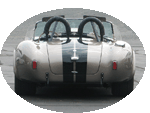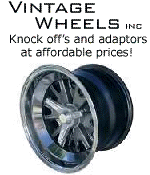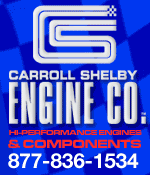 
 Main Menu
Main Menu
|
 Nevada Classics
Nevada Classics
|
 Advertise at CC
Advertise at CC
|
 November 2024
November 2024
|
| S |
M |
T |
W |
T |
F |
S |
| |
|
|
|
|
1 |
2 |
| 3 |
4 |
5 |
6 |
7 |
8 |
9 |
| 10 |
11 |
12 |
13 |
14 |
15 |
16 |
| 17 |
18 |
19 |
20 |
21 |
22 |
23 |
| 24 |
25 |
26 |
27 |
28 |
29 |
30 |
|
 CC Advertisers
CC Advertisers
|
|

02-29-2008, 05:58 AM
|
|
CC Member

|
|
|
Join Date: Mar 2001
Location: E BRUNSWICK N.J. USA,
Posts: 3,841
|
|

 Not Ranked
Not Ranked
 Materials are getting cheaper
Materials are getting cheaper
Undy It's the same thing weather you run solids or hydros. Breakin of the cam is just the start. I know alot of guys don't remove the inner springs. IMO with todays oil, the EOS additive and lucas oil is manditory for any motor to survive the first 1,000 miles. I know guys that run 3-5000 miles with only the main springs in the motor and have very good luck. They also limit the rpm's to under 3,500. There are some old threads either here or on the FE forum that talk about Johnson who makes most the lifters. Someone was maken and selling cheap lifters with low rockwell hardening on the bottom surface. I think the other thing was the camshaft cores where crap too. With all the cutting of corners today, you have too really make sure about the oil you are going to use in your motor. I get oil by the cases. Between the accusump and the motor, 12 quarts is needed. 1 bottle of EOS and 1 bottle of Lucas oil suppliment. Flat tappet are still used in some motors but on a whole either OHC motors or roller motors are here to stay. Rick L. Ps with the new stuff coming out and lighter valve trains, I am not sure why anyone would want to stay with flat tappet lifters. You can get an honest 15-30 hp different with just a camshaft change and lifters. The price of rollers has come way down from when they first hit the market. Engineers are working on lighter materials and raising the rpm and wider power bands. Next couple of years, an 8,000 rpm hydro roller motor will be running without any float of the valve train.

|
-
Advertising


02-29-2008, 06:16 AM
|
|
CC Member

|
|
|
Join Date: Mar 2001
Location: E BRUNSWICK N.J. USA,
Posts: 3,841
|
|

 Not Ranked
Not Ranked
 Didn't your change motors???
Didn't your change motors???
Excaliper Didn't you have a nasty race motor that had all kinds of issues?  After long conversations with George and Neil you went with a tamer motor that makes almost the same power and is alot more drivable.  There is a big differents between small block/ big block and there always will be. As far as camshafts and solid or hydro, the oil companies are settling this call.  Roller cams are going to be a thing of the future, either solid or hydro.  The lifter issues has been done over and over again. Hydros are better for normal driving over 100,000 miles. basicly no maintainance to the valve train. No adjustments. Make good power but not every last HP is pulled from this setup. Problem is lifters pumping up and the valves staying open. Solids, high rpm range, no valve float, depending on abuse, once or twice a year maintainance for valve lash. Wakes the motor back up after adjustments. Nice hot oil for the hands.   . Have a good day and go a little easier on the pineapple juice.       Rick L. |

02-29-2008, 06:54 AM
|
 |
CC Member

|
|
|
Join Date: Jul 2005
Location: Virginia Beach, Va & Port Charlotte, Fl.,
Posts: 2,283
|
|

 Not Ranked
Not Ranked
Rick,
I think the latest and greatest flat tappet cam profiles have much more lift and fast-ramp action then their counterpart ancestors did in the 60s, 70s and 80s. Accompanying spring rates have increased proportionately too (therein lies most of the problem). That, combined with Chinese lifters and a poorer grade of iron in the cam cores, comes together to complete the nightmare. There's just too many negatives to sway me towards a flat tappet in any performance motor that I'll build. In fact, given the same engine, the hydraulic roller will develop as much or more HP than a solid flat tappet will, at a streetable rpm. Of course, as with all things, there'll be exceptions to the rule.
Flame-on Ernie!   
Dave |

02-29-2008, 08:11 AM
|
 |
CC Member

|
|
|
Join Date: Jul 2005
Location: Bartlett,
Ill
Cobra Make, Engine: Everett-Morrison LS1
Posts: 2,448
|
|

 Not Ranked
Not Ranked
It won't sound REAL unless the lash is .025-.029
As to the manufactures developing new profiles for flat tappet style cams--we dealt with this in late 60s early 70s when I had enough of rollers scattered thru the motor--changed to flat tappet by Howard's and working with them,developed some better grinds that moved us further in front---the limiting factor ( besides valve spring availibility ) was the edge of the lifter hooking on the cam lobe---of course NASCAR runs flat tappets to 9000+ but they oil them!!!and they use mushrume lifters with a larger diameter |

02-29-2008, 08:13 AM
|
|
Senior Club Cobra Member

|
|
|
Join Date: Jul 2002
Cobra Make, Engine:
Posts: 15,712
|
|

 Not Ranked
Not Ranked

It was right at three years ago when I rebuilt that nasty 'race' motor into the more tame version I have now. At that time hydraulic rollers were still pretty expensive and rpm was limited. Being on a budget (and we all are when it comes right down to it) you have to make choices where to spend the money. I still wanted 6000 plus rpm and did NOT want another solid roller cam (which crapped out around 8000 miles in the original engine). Hence, the only viable option for me at that time was a flat tappet. Today? Perhaps I would consider a hydraulic roller, my 1968 'service block' side oiler can run hydraulic. Bear in mind the original 65-66 blocks cannot, solid is the ONLY choice.
I ran the motor about 500 miles with the inner springs removed for break in. I have and will continue to use oil with high zinc content (Shell Rotella). I also use an additive(s), which has varied. Currrently STP. I will monitor the oil market closely to see who has the best at any given time. Whats good today may be changed tommorow!
Frankly, I also wanted a solid as well for the 'soul' of the motor. I don't mind the occasional valve adjustment/check, keeps me in touch.
I DO miss the feeling of power that the old solid roller profile gave me when it 'came on the cam' about 3000 rpm. The cam I have now makes smoother power from a lower rpm to it's limit, about 6400 rpm. Surprisingly the car is darn near as fast as before, but the power output is smoother. I miss 'brutal', but there is such a downside to that when you drive everyday it gets old.
Last edited by Excaliber; 02-29-2008 at 08:20 AM..
|

02-29-2008, 11:08 AM
|
|
CC Member / Sponsor

|
|
|
Join Date: Jan 2002
Location: Provo,
UT
Cobra Make, Engine: Daytona Coupe
Posts: 1,359
|
|

 Not Ranked
Not Ranked
Quote:
Originally Posted by RICK LAKE

Good oil and 2 bottles of EOS and a bottle of Lucas oil suppliment... Start the motor and go to 2,500rpm and STAY there for 15 minutes. NO VARYING in RPM.
|
I agree with most of what Rick says but,
Before using Lucas oil treatment, you might want to read:
What about Additives?
From Crane's web site:
CraneCams
Vary the rpm up and down in this rpm range during the first 15 to 20 minutes, (do not run the engine at a steady rpm) |

02-29-2008, 11:16 AM
|
|
CC Member / Sponsor

|
|
|
Join Date: Jan 2002
Location: Provo,
UT
Cobra Make, Engine: Daytona Coupe
Posts: 1,359
|
|

 Not Ranked
Not Ranked
From Crane's web site:
"Do not use synthetic oil during the break-in period. It is not recommended to use any type of oil restrictors to the lifter galley, or use windage trays, baffles,or plug any oil return holes in the valley. Oil has a two-fold purpose, not only to lubricate, but to draw the heat away from whatever it comes in contact with. The cam needs oil splash from the crankcase, and oil run-back from the top of the engine to help draw the heat away. Without this oil flow, all the heat generated at the cam is transferred to the lifter, which can contribute to it's early demise."
Most of the oil pans used in our cars have very effective windage trays.
Last edited by Tom Kirkham; 02-29-2008 at 11:25 AM..
Reason: Added quote marks
|

02-29-2008, 11:24 AM
|
|
CC Member / Sponsor

|
|
|
Join Date: Jan 2002
Location: Provo,
UT
Cobra Make, Engine: Daytona Coupe
Posts: 1,359
|
|

 Not Ranked
Not Ranked
Quote:
Originally Posted by Jerry Clayton

of course NASCAR runs flat tappets to 9000+ but they oil them!!!and they use mushrume lifters with a larger diameter
|
Not only are they oiled, but they are also bathed in oil. Almost all Nascar blocks have a camshaft tunnel so that no oil can fall on the crank. |

02-29-2008, 12:13 PM
|
|
CC Member

|
|
|
Join Date: Jul 2003
Location: West Bloomfield,
MI
Cobra Make, Engine:
Posts: 717
|
|

 Not Ranked
Not Ranked
The NASCAR stuff is steel lifters on a stellite welded cam core - has pretty much nothing in common with normal parts.
A windage tray can't have much impact on cam oiling in a non-tunneled application - that one's just an excuse by the cam guys. Oil throw off from the crank is going in all directions including "up" to the cam.
__________________
Survival Motorsports
"I can do that....."

Engine Masters Challenge Entries
91 octane - single 4bbl - mufflers
2008 - 429 cid FE HR - 675HP
2007 - 429 cid FE MR - 659HP
2006 - 434 cid FE MR - 678HP
2005 - 505 cid FE MR - 752HP
|

02-29-2008, 12:17 PM
|
 |
Half-Ass Member

|
|
|
Join Date: Jun 2005
Cobra Make, Engine: ERA #732, 428FE (447 CID), TKO600, Solid Flat Tappet Cam, Tons of Aluminum
Posts: 22,000
|
|

 Not Ranked
Not Ranked
Quote:
Originally Posted by Barry_R

A windage tray can't have much impact on cam oiling in a non-tunneled application - that one's just an excuse by the cam guys.
|
That's what I thought. Barry, BTW how is your ZDDP supplement coming? |

02-29-2008, 12:57 PM
|
|
CC Member

|
|
|
Join Date: Mar 2001
Location: E BRUNSWICK N.J. USA,
Posts: 3,841
|
|

 Not Ranked
Not Ranked
 No buying another companies claims
No buying another companies claims
Tom Kirkham. Tom I have run lucas in my cars and trucks for 4 years. That foaming of the oil is crap. I go 1K miles to run&gun at gateway. Straight 12 hours of driving I have NEVER seen the oil in my truck LOOK like a coolant/ water mixture. I also check the oil every 250 miles when I gas up. Lucas is a clinging oil to parts. The ONLY down side I have found is a possible loss of O2 sensor reaction to the throttle. The O2 speed slows down over time. I clean them with TEC and they pick back up again. I have tested Lucas with my cars and trucks. I have let them sit for 3 weeks and done startups, NO noise from any of them. I have raced the cobra and to date have not got the oil to foam. Burnt smell yes. As for Cranes tech info, IMO I don't agree. As the motor breaks in the rpm's go up by themselves. I adjust the rpm back and try and maintain the 2,500 rpm. Tom I am no pro builder. The rings for the pistons and the cylinder finish are the main reason for breakin. You will know in the first 30 seconds if the motor is alright, that's about 90% of the time. 30 years of old school building of motors still works for my motors.  We are still have fights about high oil pressures in FE motors. The old masters of the 60's are running in the high 60's to low 80 psi, with an FE bottom end. I have not seen one set of bearings that are worn out from excessive oil pressure. I run 130+ psi when the motor is started. The FI system control the high idle for the first 3 minutes. By this time the engine has some heat building up and the oil pressure gauge is not pinned. I prelube the motor before starting also. I put the 482 kit from Barry R. in my Shelby motor last Sept. The 452 bearings, the crank and rods looked perfect. This is with about 50 passes at the 1/4 mile. About 200 miles of roadracing, and god knows how much autocross runs I have made. 2-300. Low speed under 50mph and high G force turns. I break my motors in on the highways with running between 2,000 rpm and going to 3,500 rpm. Back and forward. As more miles happen I up the rpms to the Max with a min. of 500 miles on the motor. I also do many oil changes, 2-3 by 500 miles and check each filter for those little metal particles. I don't know what the air gap is in that tester but, I am sure that has something to do with the foaming. It's all about choice Tom. As for the synthetic oil, some motors come off the assembly lines with Mobil 1 in the crankcase. I think the crosshairs and the finish of the cylinder walls have alot to do with the breakin of Low tension rings also. Tom I bet you spent a couple of years doing research for your company. You continue to do this today. To make the best, better. The fit and finish I have seen on Kirkhams speaks for itself. It's the same with motors, what works you stay with. Every once in a while You do play outside the box, but not too far.   Professor Morris car is some machine.  Rick L.

|

02-29-2008, 01:06 PM
|
|
CC Member

|
|
|
Join Date: Mar 2001
Location: E BRUNSWICK N.J. USA,
Posts: 3,841
|
|

 Not Ranked
Not Ranked
 You might know Barry
You might know Barry
Barry R. As for Nascar I think there motors have spray bars and jets for oiling the most important parts of the motor. The spray bars are part of the valve covers and put oil on each valve spring to help in cooling it. As for the lifters, I know they are flat tappets but have a mushroom shape on the bottom surface for the high lift cams. I also thought they used small jets to spray directly on the contact point of the camshaft and lifter. They use spray jets on the diesels now to help with cooling of the pistons. Turbo and supercharger guys could learn something from this. Lower combustion temps more power and timing. Rick L. Ps what new with EMC this year??
|
 Posting Rules
Posting Rules
|
You may not post new threads
You may not post replies
You may not post attachments
You may not edit your posts
HTML code is Off
|
|
|
All times are GMT -7. The time now is 04:35 AM.
|


















 After long conversations with George and Neil you went with a tamer motor that makes almost the same power and is alot more drivable.
After long conversations with George and Neil you went with a tamer motor that makes almost the same power and is alot more drivable. There is a big differents between small block/ big block and there always will be. As far as camshafts and solid or hydro, the
There is a big differents between small block/ big block and there always will be. As far as camshafts and solid or hydro, the 
 . Have a good day and go a little easier on the pineapple juice.
. Have a good day and go a little easier on the pineapple juice.





 Rick L.
Rick L. Linear Mode
Linear Mode



